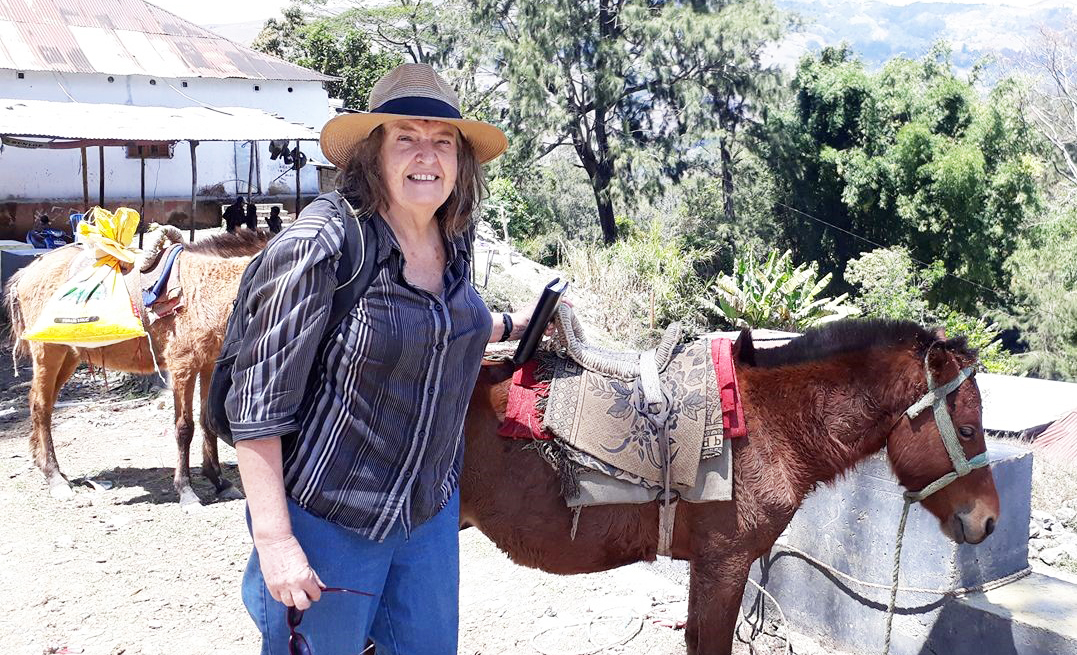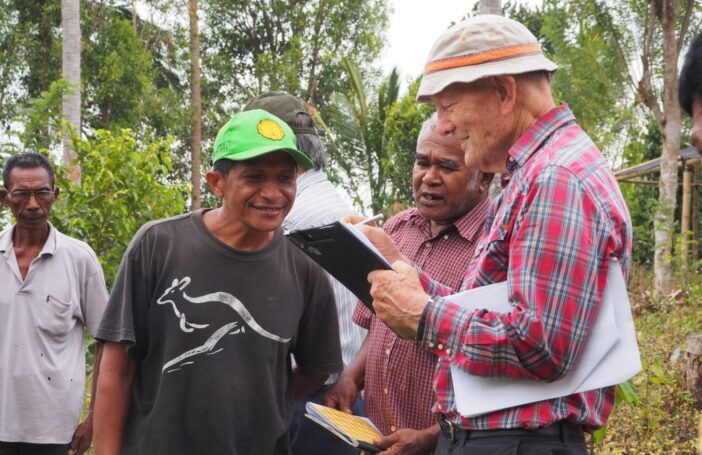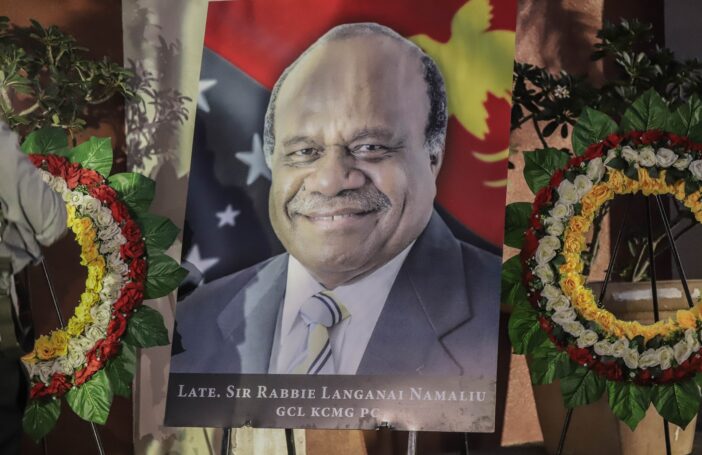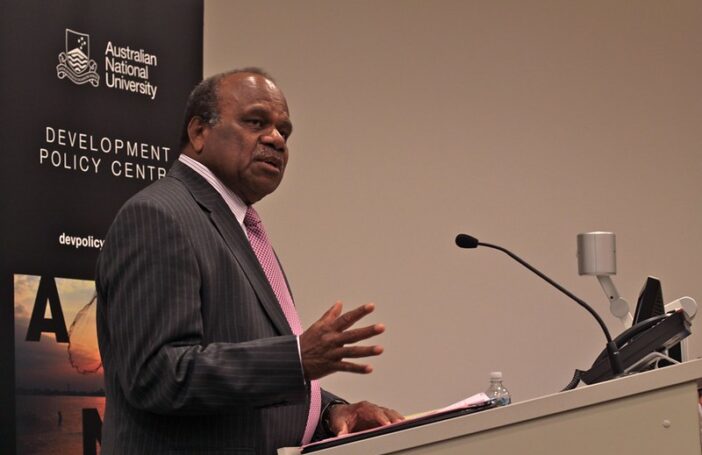When Melbourne-born Helen Hill, an outstanding social activist, scholar and academic, died on May 7, 2024, at the age of 79, the Timorese government sent its Minister for Education, Dulce de Jesus Soares, to deliver a moving eulogy at the funeral service at Church of All Nations in Carlton. Helen will be remembered for many things, but above all for her 50 years of dedication to friendship with the people of Timor-Leste and solidarity in their struggle for independence.
At the funeral, Steve Bracks, chancellor of Victoria University and former premier of Victoria, also paid tribute to Helen’s lifetime commitment to social justice and to the independence and flourishing of Timor-Leste in particular. Further testimonies were presented by Jean McLean (formerly a member of the Victorian Legislative Council), the Australia-East Timor Association, representatives of local Timorese groups and Helen’s family. Helen’s long-time friend, the Reverend Barbara Gayler, preached on the theme of solidarity.
Helen was born on February 22, 1945, the eldest of four children of Robert Hill and Jessie Scovell. Her sister Alison predeceased her, and she is survived by her sister Margaret and her brother Ian and their children and grandchildren. Her father fought with the Australian army in New Guinea before working for the Commonwealth Bank and becoming a branch manager. Her mother was a social worker at the repatriation hospital. The family were members of the Presbyterian Church in Blackburn, which fostered an attitude of caring for others.
Helen’s secondary schooling was at Presbyterian Ladies College, where she enjoyed communal activities such as choir. She began a science course at the University of Melbourne but transferred to Monash University to study sociology and political science, graduating with a BA (Hons) in 1970. At Monash, Helen was an enthusiastic member of the Labor Club and the Student Christian Movement (SCM), where issues of social justice were regularly debated.
Opposition to the war in Vietnam was the main focus of concern during her time at Monash. In 1970, Helen was a member of the organising committee for the first moratorium demonstration in Melbourne and also a member of the executive committee of the Australian SCM (ASCM, the national body) which was based in Melbourne. She edited Political Concern, an alternative information service, for ASCM. In 1971, Helen was a founding member of International Development Action. Helen was a great networker, always ready to see what she could learn from others.
Perhaps the most formative moment in Helen’s career was her appointment as a frontier intern, to work on the Southern Africa section of the Europe/Africa Project of the World Student Christian Federation, based in London (1971-1973). This project aimed to document how colonial powers had exploited the resources of their colonies, as well as the impact of apartheid in South Africa. In those years, she also studied at the Institute d’Action Culturelle in Geneva, which was established by Paulo Freire, arguably her most significant teacher. The insights and contacts from this time of engagement with global issues of justice and education provided a strong foundation for Helen’s subsequent career.
In 1974, Helen embarked on a Master of Arts course supervised by the late Professor Herb Feith. Helen had met student leaders from the Portuguese colonies of Mozambique and Angola in the Europe/Africa project, who asked her about East Timor (“so close to Australia”). Recognising that she, along with most Australians, knew very little about East Timor, Helen proposed East Timor as the focus of her master’s thesis. She began to learn Portuguese for this purpose. Following the overthrow of the authoritarian regime in Portugal in April 1974 and the consequent opportunities for independence in the Portuguese colonies, she visited East Timor for three months in early 1975, where she was impressed by the program and leadership of Fretilin, the main independence party.
Her plans were thwarted by the Indonesian invasion of East Timor in December 1975, and she was unable to revisit East Timor until after the achievement of independence in 2000. Her 1978 Master of Arts thesis included an account of the Fretilin plans rather than the Fretilin achievements. Her 1976 book, The Timor Story, was a significant document of the desire of East Timorese people for independence and influenced the keeping of East Timor on the UN decolonisation list. She was a co-founder of the Australia-East Timor Association, which was founded in the initial days of the Indonesian invasion.
Helen was a founding member of the organisation Campaign Against Racial Exploitation in 1975. She was prolific in writing and speaking for these causes, not simply as an advocate, but also as a capable analyst of many situations of decolonisation. She was published regularly in the Nation Review and also appeared in many other publications concerned with international affairs and development.
Helen was awarded a rare diploma of education (tertiary education method) from the University of Melbourne in 1980. From 1980 to 1983, she was a full-time doctoral student at Australian National University, culminating in a thesis about non-formal education and development in Fiji, New Caledonia and the Trust Territory of the Pacific Islands (the islands of the north Pacific). Helen participated in significant international conferences on education and development in these years and was involved in occasional teaching in the nations and territories of her thesis.
In 1991, she was appointed lecturer at Victoria University to teach development studies, which, among other things, attracted a steady stream of students from Timor-Leste. In 2000, she was able to return to Timor-Leste as part of her work for Victoria University. An immediate fruit of her work in 2001 was a memorandum of understanding between Victoria University and the Dili Institute of Technology, followed in 2005 with another between Victoria University and the National University of Timor-Leste.
One outcome of this latter relationship has been biennial conferences on development, held in Dili. Also in 2005, she was a co-founder of the Timor-Leste Studies Association. Helen stood for quality education and for high academic standards that can empower all students. In 2014, Helen was honoured by the government of Timor-Leste with the award of the Order of Timor-Leste (OT-L).
Retiring from Victoria University in 2014, Helen chose to live in Timor-Leste, while returning to Melbourne regularly. She continued to teach in Dili and was employed by the Timor-Leste Ministry of Education in 2014 and from 2018 until her death.
Helen came to Melbourne in late 2023, planning to return to Timor-Leste early in 2024, where further work awaited her. A routine medical check-up unexpectedly found significant but symptom-free cancer, which developed rapidly, though it did not prevent her from attending public events days before her death on May 7. Friends and family are fulsome in their praise of Helen’s brother Ian, who took time off work to give her daily care during her last weeks.
Helen had a distinguished academic career, with significant teaching and research focusing on the links between development and education, particularly in the Pacific context, though with a fully global perspective. Helen had an ever-expanding network of contacts and friends around the world, on whom she relied for critical enlightenment on issues of concern.
From Blackburn to Dili, inspired by sharp intelligence, compassion, Christian faith and a careful reading of the signs of the times, Helen lived by a vision of the common good and strove mightily to build a world of peace and justice.
Sandy Yule wrote this tribute with help from Helen Hill’s family and friends. It was first published by The Age newspaper.





Thank you for this moving tribute to Helen’s life. She was a wonderfully caring person who supported a huge number of worthy causes and benefitted the lives and careers of multiple people around the world.
Thank you for including this photo of her with a Timor Pony. She was very worried that these wonderful animals (whose bloodlines contributed to the hardy Australia Waler horse) are dying out. How wonderful it would be if a conservation program could be established in Helen’s name.